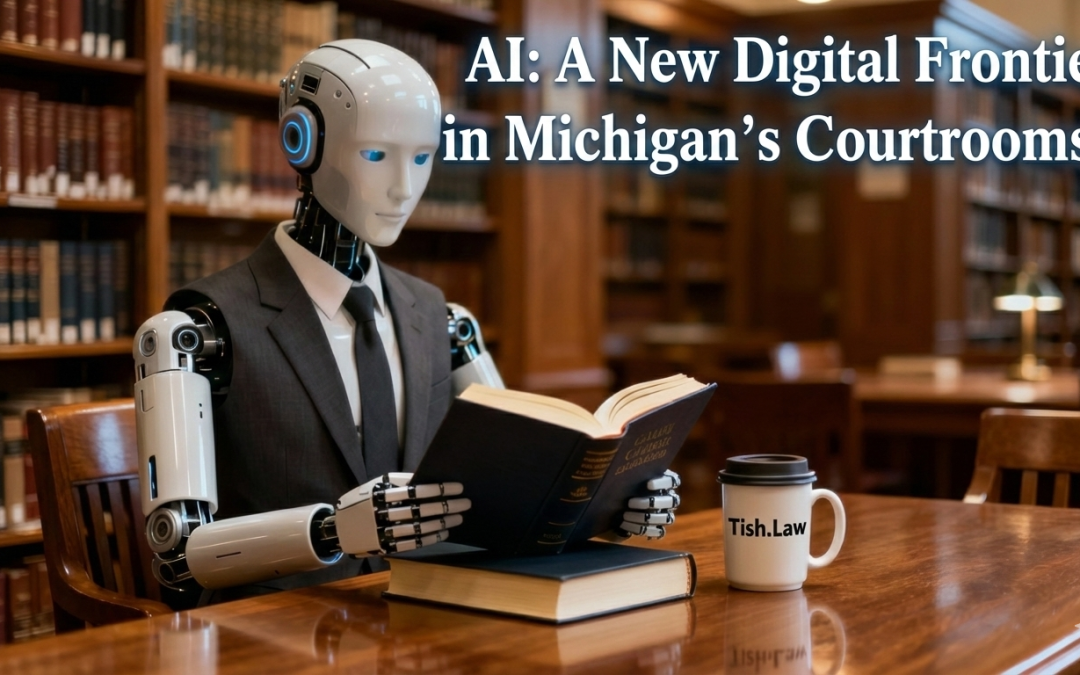Artificial intelligence(AI) is no longer science fiction for Michigan businesses—it’s become an operational reality. In boardrooms and courtrooms across the state, disputes now arise over data usage, algorithmic bias, deepfakes, trade secrets, and contract breaches involving machine-learning tools.
Michigan courts are quickly adapting to these challenges. General counsel and business leaders should be alert to the rapid developments shaping Michigan’s AI litigation landscape.
Please note this blog post should be used for learning and illustrative purposes. It is not a substitute for an attorney with expertise in this area. If you have questions about a specific legal issue, we always recommend that you consult an attorney to discuss the particulars of your case.
AI-Generated Evidence Faces Heightened Scrutiny
Whether it’s a chatbot transcript, a model audit, or a synthetic deepfake, the admissibility of AI-generated evidence depends on proper authentication. Michigan Rules of Evidence 901 emphasizes the importance of foundations such as witness testimony, metadata, chain of custody, and expert analysis. Reliable e-discovery—covering prompts, training data, and logs—has become central to the evaluation of generative AI evidence
Judicial Guidance and Emerging Practices
In 2024, the Michigan Judicial Council’s generative AI report spotlighted the evolving opportunities and risks for trial courts statewide. It’s more than policy—it’s a foretaste of future docket management, e-filing, and evidence handling, with generative AI increasingly part of routine court practice. Businesses should expect ongoing guidance as courts balance innovation with procedural fairness.
Disclosure and Accuracy Under the Microscope
Across the country, judges and districts are issuing standing orders and draft rules regarding AI in legal briefs. The Eastern District of Michigan is exploring local AI rules, consistent with a clear national trend: if generative tools are used in your filings, attorneys must validate citations, protect confidentiality, and be fully transparent about how AI has assisted their work
Ethics Remain Paramount
The State Bar of Michigan’s AI FAQs serve as a reminder that duties of competence, diligence, confidentiality, and supervision apply in the age of AI. The American Bar Association also underscores the need for accuracy checks and client-data security. For corporate clients, this means vetting vendors, documenting model use, and maintaining records that demonstrate reasonable care.
Legislation Targeting AI Harms
Michigan lawmakers have started passing measures to address harms caused by AI—especially deepfakes. These new laws create enforcement mechanisms and potential civil exposure, which elevates risk for businesses in areas like advertising, brand safety, and synthetic media created by employees.
Michigan Courts Set New Standards
We now see closer scrutiny of AI-generated evidence under the rules, strengthened e-discovery procedures, and more robust early motion practice focused on authentication and reliability. Judges increasingly weigh expert testimony on machine-learning methods, consider privilege claims concerning model architecture, and issue tailored protective orders for bias analyses. In contract and trade secret disputes, courts are parsing new AI-specific clauses and applying traditional remedies in technical contexts.
The Bottom Line
Michigan courts and legislators are establishing critical guardrails for AI disputes. As the treatment of generative AI continues to standardize, businesses and counsel with strong authentication, transparent systems, and thorough discovery records will fare best in court.
Contact Tishkoff
Tishkoff PLC specializes in business law and litigation. For inquiries, contact us at www.tish.law/contact/. Check out Tishkoff PLC’s Website(www.Tish.Law/), eBooks(www.Tish.Law/e-books), Blogs(www.Tish.Law/blog) and References(www.Tish.Law/resources).
References
- Mich. Judicial Council, Generative AI and the Courts Workgroup Report (Oct. 2024), https://www.courts.michigan.gov/4aec3b/siteassets/committees,-boards-special-initiatves/michigan-judicial-council/2024-genai-wg-report.pdf.
- Mich. R. Evid. 901.
- State Bar of Michigan, Artificial Intelligence FAQs (Feb. 10, 2025), https://www.michbar.org/opinions/ethics/AIFAQs.
- Eastern District of Michigan, Proposed Tule on Artificial Intelligence in Legal Filings (2025), https://www.law360.com/pulse/ai-tracker.
- Mich. Comp. Laws Ann. § (2023) (recent amendments on deepfake legislation).

